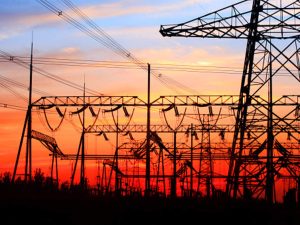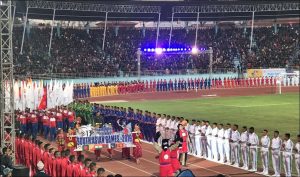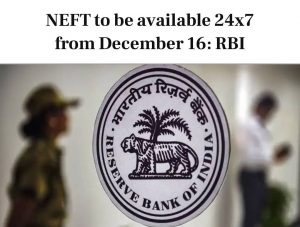 National Energy Conservation Week is celebrated all over India from December 14 to December 20. Various Government enterprises and Public Sector Undertakings celebrate the week by organizing energy conservation message-oriented activities. National Energy Conservation Week is celebrated all over India from December 14 to December 20. Various Government enterprises and Public Sector Undertakings celebrate the week by organizing energy conservation message-oriented activities. |
|
 National Thermal Power Corporation Limited has signed a term loan agreement for Rs. 5,000 crore with State Bank of India. The loan facility has been extended at an interest rate linked to 3 Months MCLR of the bank and has a door to door tenure of 15 years. The loan will be utilised to part finance the capital expenditure of NTPC. National Thermal Power Corporation Limited has signed a term loan agreement for Rs. 5,000 crore with State Bank of India. The loan facility has been extended at an interest rate linked to 3 Months MCLR of the bank and has a door to door tenure of 15 years. The loan will be utilised to part finance the capital expenditure of NTPC. |
| Source- The Hindu Business Line |
 Human Library, a concept which seeks to replace books with humans, was held in the City of Palaces, Mysuru, Karnataka. It was organized by international non-profit organization- Human Library for first time in Mysuru. The objective of this event was to break past long-standing prejudices and stereotypes by creating a safe framework for conservation by using a library analogy of lending people rather than books. It also intended to generate greater human cohesion across various social, religious and ethnic diversities. This event provides readers of human library opportunity to borrow Human Books and to engage in conversation with the books. It also helps them to acknowledge the need for a change in societal attitudes and encourage social reforms. Human Library, a concept which seeks to replace books with humans, was held in the City of Palaces, Mysuru, Karnataka. It was organized by international non-profit organization- Human Library for first time in Mysuru. The objective of this event was to break past long-standing prejudices and stereotypes by creating a safe framework for conservation by using a library analogy of lending people rather than books. It also intended to generate greater human cohesion across various social, religious and ethnic diversities. This event provides readers of human library opportunity to borrow Human Books and to engage in conversation with the books. It also helps them to acknowledge the need for a change in societal attitudes and encourage social reforms. |
|
 The central and state authorities organised GST (Goods and Services Tax) Stakeholder Feedback Diwas on 7 December 2019. The aim of organizing this event was to get an on-the-spot response and suggestion to the new system for filing GST Returns to be introduced from next fiscal year. The new return form will be made mandatory from 1 April 2020. The programme was organised on the new system for filing returns across 125 cities to get on-the-spot response and suggestion. The central and state authorities organised GST (Goods and Services Tax) Stakeholder Feedback Diwas on 7 December 2019. The aim of organizing this event was to get an on-the-spot response and suggestion to the new system for filing GST Returns to be introduced from next fiscal year. The new return form will be made mandatory from 1 April 2020. The programme was organised on the new system for filing returns across 125 cities to get on-the-spot response and suggestion. |
|
 The data from the High Courts across the country say that more than 96% of 1,66,882 rape trials registered under POCSO (Protection of Children from Sexual Offences Act) are pending. After receiving the data, law ministry has drawn comprehensive plans to fast track disposal of pending rape cases within a year. The plan is to set up fast track courts to hasten the process. The data from the High Courts across the country say that more than 96% of 1,66,882 rape trials registered under POCSO (Protection of Children from Sexual Offences Act) are pending. After receiving the data, law ministry has drawn comprehensive plans to fast track disposal of pending rape cases within a year. The plan is to set up fast track courts to hasten the process. |
|
 On December 6, 2019, MP Sarojni Hembram from Odisha for the first time spoke in a tribal language called Santhali. She raised the matter of public importance during the zero hour. Also, Srimati Sarojini demanded Bharat Ratna for Pundit Raghunath Murmu, the Santhali scholar who introduced Ol Chiki script for the language in 1925. On December 6, 2019, MP Sarojni Hembram from Odisha for the first time spoke in a tribal language called Santhali. She raised the matter of public importance during the zero hour. Also, Srimati Sarojini demanded Bharat Ratna for Pundit Raghunath Murmu, the Santhali scholar who introduced Ol Chiki script for the language in 1925. |
|
 Recently the Indian Representative to Palestine, Sunil Kumar released the third tranche of funding for the construction of India-Palestine techno park in Palestine. India had committed to invest 12 million USD as a part of capacity building in Palestine. India currently pays 3 million USD on half yearly basis Recently the Indian Representative to Palestine, Sunil Kumar released the third tranche of funding for the construction of India-Palestine techno park in Palestine. India had committed to invest 12 million USD as a part of capacity building in Palestine. India currently pays 3 million USD on half yearly basis |
|
 India has won 110 gold, 69 silver and 35 bronze at the South Asian Games, 2019. On the whole India won 214 medals. The event was held in Nepal. India has won 110 gold, 69 silver and 35 bronze at the South Asian Games, 2019. On the whole India won 214 medals. The event was held in Nepal. |
|
 The Central Government launched the National Clean Air Programme (NCAP) as a long-term, time-bound, national-level strategy to tackle the air pollution problem across the country in a comprehensive manner. The government is targeting to achieve 20 per cent to 30 per cent reduction in Particulate Matter PM10 and PM2.5 concentrations by 2024 keeping 2017 as the base year for the comparison of concentration. Under NCAP, 102 non-attainment cities have been identified based on ambient air quality data for the period 2011 – 2015 and WHO report 2014 – 2018. The Central Government launched the National Clean Air Programme (NCAP) as a long-term, time-bound, national-level strategy to tackle the air pollution problem across the country in a comprehensive manner. The government is targeting to achieve 20 per cent to 30 per cent reduction in Particulate Matter PM10 and PM2.5 concentrations by 2024 keeping 2017 as the base year for the comparison of concentration. Under NCAP, 102 non-attainment cities have been identified based on ambient air quality data for the period 2011 – 2015 and WHO report 2014 – 2018. |
| Source: The News on AIR |
 The Reserve Bank of India announced round-the-clock transactions will be allowed 24×7 facility under the National Electronic Funds Transfer (NEFT) system on all days including weekends and holidays from December 16. These transactions after the usual banking hours are set to be automated initiated using ‘Straight Through Processing (STP)’ modes by the banks. The existing discipline for crediting the beneficiary’s account or returning the transaction within 2 hours of settlement to the originating bank will also continue. Member banks are also advised to initiate necessary action and ensure availability of all necessary infrastructural requirements at their end for providing seamless NEFT 24×7 facility to their customers. The Reserve Bank of India announced round-the-clock transactions will be allowed 24×7 facility under the National Electronic Funds Transfer (NEFT) system on all days including weekends and holidays from December 16. These transactions after the usual banking hours are set to be automated initiated using ‘Straight Through Processing (STP)’ modes by the banks. The existing discipline for crediting the beneficiary’s account or returning the transaction within 2 hours of settlement to the originating bank will also continue. Member banks are also advised to initiate necessary action and ensure availability of all necessary infrastructural requirements at their end for providing seamless NEFT 24×7 facility to their customers. |
| Source: The News on AIR |
You need to login to perform this action.
You will be redirected in
3 sec
